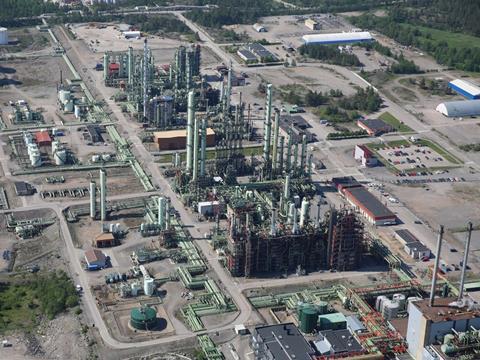
Borealis has announced a €4.5 million investment in the cracker furnaces at its olefins unit in Porvoo, Finland, aiming to increase the share of renewable and recycled raw materials used in its ethylene and polypropylene production.
The Porvoo investment programme, expected to be completed in 2025, follows last year’s completion of a major cracker furnace update in Stenungsund, Sweden.
The Porvoo steam cracker, which has a nameplate capacity of 430 kilotons ethylene and 263 kilotons propylene per year, is a facility that thermally “cracks” feedstock such as naphtha, propane, butane, and liquefied petroleum gas (LPG) into smaller molecules.
As a result of the investment, the company states that three of its ten cracker furnaces in the olefins unit will be modified to enable a total annual production of 120 kilotons of base chemicals, based on renewable and recycled feedstocks.
The renewable and chemically recycled base chemicals produced at Borealis’ Porvoo site have reportedly been awarded the International Sustainability and Carbon Certification (ISCC PLUS). The ISCC PLUS certification is a voluntary scheme that covers the entire supply chain based on mass balance accounting and guarantees compliance with environmental standards.
“Through strategic furnace modifications and a commitment to renewable and chemically recycled base chemicals, we are poised to elevate annual production to 120 kilotons, forging a path of environmental stewardship and economic resilience,” says Wolfram Krenn, Borealis executive vice president of Operations and Base Chemicals.
Earlier this year, European electricity and heat retailer Vattenfall announced it will be supplying Borealis with renewable energy from its hydropower plants, as part of a long-term renewable hydropower purchase agreement (PPA) made in December 2023. Vattenfall will apparently supply 175 GWh of renewable energy per year to Borealis’ operations in Stenungsund from its hydropower plants, located along the Lule River in Sweden.
More recently, Neste and South Korean chemical company Lotte Chemical have partnered to replace fossil resources with renewable raw materials in the manufacturing of chemicals and plastics. The collaboration aims to enable products and applications with a lower carbon footprint compared to those produced from fossil resources.
If you liked this story, you might also enjoy:
Report: The ultimate guide to global plastic sustainability regulation
The Brief: Oxo-(bio)degradables: the who, what, and why of breaking down fossil-based plastics
Sustainable Packaging Summit: How Kraft-Heinz uses collaboration to drive innovation
The Brief: Using ocean-bound plastic in packaging – how, why and should we?














No comments yet